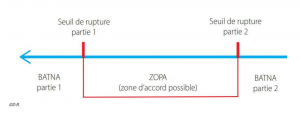The «Batna», an essential tool in any negotiation

The «Batna», an essential tool in any negotiation
The Batna, or the best alternative to the negotiated solution, allows the discussion to begin calmly.
Who is not familiar with the Batna (1), the cornerstone of integrative negotiation taught by the Harvard Business School (2) since the 1980s? This concept aims to make the negotiator aware of the importance of identifying his or her best alternative to the negotiated agreement and thus his or her breaking point. If each negotiator is well prepared, a Zopa, or Zone of Possible Agreement, emerges between the breakpoints of the participants.

In practice, however, these concepts are not easy to handle because negotiations often evoke emotions that are difficult to manage. Here are some practical tips.
- Good preparation
Everything starts with good preparation. By determining your fall-back position, you can start the negotiation more calmly. Because when the discussion gets tense, you will know how far you should go. Make a concrete list of all your alternatives, evaluate them by calculating their value, choose the most suitable option and determine your breaking point. Do the same exercise to guess the other party’s Batna, even if it is more difficult.
- A solid Batna
What to do if your Batna is not solid? Quite often you get the impression that you are starting from a weak position. This is not abnormal, because if you were in a position of absolute strength, there would be no negotiation. The purpose of preparation is to strengthen your Batna and put the other party’s Batna into perspective. The stronger your Batna, the less you will need it.
- Strengthen your Batna
How do you strengthen your Batna? It depends on the situation, of course, but in all cases it is a matter of creativity and initiative. Study the market and prices, look for new angles, contact other potential enthusiasts, consider alternative solutions (recruitment, training, etc.) or engage an expert. Your alternatives should be viable and accurate so that they can convince you.
- Work on different fronts
What fronts can you work on? Negotiating power depends on many factors. Financial dependence is an obvious criterion, but it is also important to understand which elements can change. The power of influence, legitimacy and reputation are often underestimated. Understanding the importance of time (who benefits from the status quo?) is also essential.
- Act subtly
Should you disclose your Batna? Again, this depends on the context and you need to act subtly. Disclosing a weak Batna is obviously not a good idea, but neither is bluffing because if the other party finds out, you will lose credibility. Sharing information, with tact and respect, helps to move forward, but this requires a climate of trust between the parties. In any case, avoid disclosing your BATNA too early, as this can be perceived as a threat. Threats damage relationships..
- A double-edged sword
If the Batna is used without nuance, it is likely to be taken badly by the other party. Similarly, do not get upset if someone questions the strength of your arguments. Be prepared that someone will try to discredit your Batna. If you show nervousness or irritation, the interlocutor will know that you are in a weak position. On the other hand, if you respond with boldness and thoughtfulness, you will increase the chances of achieving your goals. Negotiation is part of our daily lives. Whether in a private or professional context, we all have to take positions and defend our position. Yet many negotiations fail or leave participants dissatisfied. Negotiating by force is a dangerous strategy.
To “win” your negotiations, focus on listening, mutual respect and good preparation.
1) Batna stands for Best Alternative To a Negotiated Agreement. In French: Mesore pour Meilleure Solution de Rechange.
(2) The book Getting to Yes by Robert Fisher and William Ury, published in 1981, is the reference work for the so-called Harvard or integrative negotiation method.
Article written by Tanguy della Faille
Certified mediator
tanguy.della.faille@fb-mediation.com



